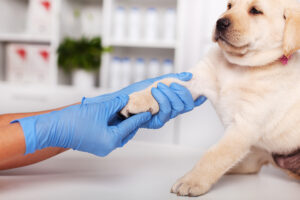
If you suspect that your pet has suffered a fracture, there are some next steps you need to take to ensure they get the care they need to heal.
As pet owners, our furry friends’ health and well-being are always a top priority. One of the more distressing situations we may face is the possibility that our pet has suffered a fracture. Whether it’s a limb or a digit, recognizing the signs of a fracture and knowing the appropriate steps to take can make a significant difference in your pet’s recovery. Here’s what you need to know about identifying fractures in pets and what to do if you suspect your pet has one.
Signs That Your Pet May Have a Fracture
Limping or Lameness
One of the most obvious signs of a fracture is limping or lameness. If your pet is reluctant to put weight on a particular leg or is walking in an unusual manner, it could be an indication of a fracture.
Swelling and Bruising
Fractures often cause swelling and bruising around the injured area. If you notice unusual swelling or discoloration on your pet’s limb or digit, it’s a sign that something might be wrong.
Visible Deformity
In some cases, a fracture can cause a visible deformity where the bone is misaligned. If you notice an abnormal shape or angle in your pet’s limb, it could indicate a broken bone.
Pain and Sensitivity
Pets may exhibit signs of pain, such as whining, growling, or biting when the injured area is touched. They might also lick or chew at the painful spot.
Reluctance to Move
If your pet is unusually still, avoiding movement, or showing reluctance to participate in their normal activities, it could be due to the pain of a fracture.
Crying or Vocalizing
Animals often cry or vocalize when they are in pain. If your pet is making unusual noises, especially when trying to move, this could be a sign of a fracture.
Behavioral Changes
Changes in behavior, such as irritability, aggression, or withdrawal, can also indicate pain and injury. A normally playful pet that suddenly becomes aggressive or hides away might be experiencing significant discomfort.
What to Do If You Suspect Your Pet Has a Fracture
Stay Calm
Your pet can pick up on your emotions, so it’s important to stay calm. Approach your pet carefully to avoid causing additional stress or injury.
Restrict Movement
Minimize your pet’s movement to prevent further injury. Encourage them to lie down and stay still until you can seek veterinary assistance.
Transport Safely
When transporting your pet to the vet, use a carrier or box to keep them secure and limit movement. For larger pets, use a blanket or stretcher to support them.
Seek Veterinary Care Immediately
Contact your veterinarian as soon as possible. Fractures require professional medical attention to ensure proper healing and to prevent complications. Your vet may perform X-rays to diagnose the fracture and determine the best course of treatment, which could include splinting, casting, or even surgery.
Follow Aftercare Instructions
After your pet has been treated, follow your vet’s aftercare instructions carefully. This may include keeping the pet’s activity level low, administering medications, and attending follow-up appointments.
Monitor for Complications
Keep an eye on the injured area for signs of infection or improper healing, such as increased swelling, redness, or discharge. Notify your vet immediately if you notice any concerning changes.
Prevention Tips
While accidents can happen, there are ways to minimize the risk of fractures:
Supervise Play
Supervise your pets during play, especially around other animals or in potentially hazardous areas.
Pet-Proof Your Home
Ensure your home is safe for your pets by securing furniture, removing hazards, and providing a safe environment for them to explore.
Regular Vet Check-Ups
Regular veterinary visits can help catch health issues early and keep your pet in good physical condition, reducing the risk of fractures from weakened bones.
Trust Maryland Veterinary Surgical Services With Your Companion’s Health
Your companion’s health is important, and the team at MVSS is ready to provide the best care possible for your furry family. We are dedicated to combining comprehensive exams and assessments with informative and honest discussions of your companion’s care. Once we have worked with you to decide on the best course of action for your dog, our professionals will use their surgical expertise to work towards the goal of giving your companion an active and pain-free life. We are proud to serve loyal companions in Catonsville and Baltimore. To learn more about our services, give us a call at 410-788-4088 or visit us online. For more information and tips for dog health, follow us on Facebook and Pinterest.
